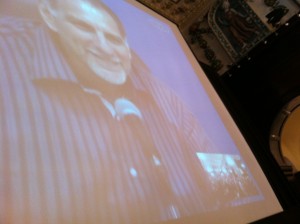On Friday 7 March 2014 the International Commission of Inquiry into the case of the Cuban 5, opened its doors at the Law Society in Chancery Lane, in London. I was one of the co-ordinators.
Rene Gonzalez – the first of the Cuban 5 to be released – was to be the star guest. However, earlier in the week he was refused a visa to attend, because he had a conviction which had resulted in a sentence of more than 4 years in custody – ironically, the very reason he was coming to London. At a last minute Judicial Review on Thursday afternoon, the judge said that he would not overturn the decision to refuse the visa, partly because there were other means whereby Rene Gonzalez could give his testimony. One of them, the judge said, was by Skype. I wonder if the judge has ever Skyped, to an international audience of 300 people, from a distant land. It was not easy – the connection broke up, we lost visual contact, the sound was uneven. But Rene Gonzalez gave his testimony.
The issues that are raised in the case of the Cuban 5, sometimes known as the Miami 5, are the rule of law, the right to a fair trial, and political decisions described as judicial procedure.
Most people know that there is a difficult relationship between Cuba and the US. After the revolution in 1959 many people left Cuba and settled in Miami. A large number of them are passionately opposed to the current Cuban administration and are actively working in Miami to weaken and ultimately bring down the Cuban government. Fidel Castro is a political leader against whom there has been the greatest number of assassination attempts, ever.
Over the years there have been terrorist acts against the Cuban state, both in Cuba and elsewhere. People have been injured and killed.
In the morning of 4 September 1997 explosions shook three tourist hotels in the Cuban capital of Havana, killing an Italian resident of Canada. The explosions were the latest in a series of bombings at Havana hotels, but the first to result in a death. On 5 August 1997 there had been an explosion at the tourist Hotel Melia Cohiba. On 12 July 1997 a small explosion in the Nacional and Capri hotels injured three people. These explosions were ostensibly part of a campaign by dissidents, aimed at the growing Cuban tourist industry. There had also been an explosion on 4 August 1997 at a Cuban tourism office in Nassau in the Bahamas. For more information see the documents referred to by Stephen Kimber in his book What Lies Across the Water
Cuba sent people to infiltrate the groups working in Miami. It seems clear that the US authorities were aware of the groups activities, and also the fact that Cubans were coming over to in effect spy on those groups. In 1998 the 5 were arrested. They were kept in solitary confinement for 17 months. They were not allowed to see all of the prosecution papers – not even papers which had been seized from their own homes. An application to move the trial away from the area – where 50% of residents were Cuban Americans – was refused. There was a concerted media campaign against the 5 during the trial.
Appeals have been made – in one case, the convictions were overturned because of the refusal to move the trial – but that decision was in itself appealed.
And so – an Internation Commission of Inquiry with a panel of three eminent jurists, from India, France and South Africa, taking place over two days, in the great hall of the Law Society building on Chancery Lane. Three hundred people attended, from 27 countries. The languages of the Inquiry were English and Spanish, with volunteer interpreters doing a magnificent job.


